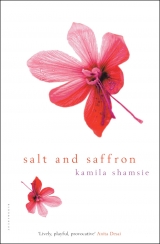
Текст книги "Salt and Saffron"
Автор книги: Kamila Shamsie
Жанр:
Современная проза
сообщить о нарушении
Текущая страница: 12 (всего у книги 15 страниц)
There – I’ve done my bit. Now I’m going to give you a message from him, which he wrote on my arm in some bloody indelible ink which refused to come off until half a bar of soap later. He wrote: ‘Footfalls echo in the memory/Down the passage which we did not take/Towards the door we never opened/Into the rose garden. My words echo/Thus, in your mind.’
It’s all a bit too pseudo for me, but I suppose you think it’s charming. (Quoting Yeats is charming, Aliya; quoting Eliot is showing off.) He’s still not sure when he’ll be in Karachi, but he will be there before the summer is through. I’ve had to thoroughly wrestle with my conscience about relaying his message to you, but Rehana Apa said she’d tie me to Nelson’s column and feed prunes and bran fibre to the pigeons if I didn’t do it and pronto. Now, don’t expect another message from me for a while. This is all too exhausting and I have to read too many books on fiscal policies of Indian rulers in the eighteenth century.
Love to the family (excl. Starcheds),
Samia.
The passage we didn’t take. The door we never opened. What was I thinking? Sameer was right – I’d talked to Khaleel for half an hour … No, actually, it was more like an hour. I’ve never drunk a cup of coffee so slowly. Still, just an hour. Besides, I had no intention of getting married before I finished my MA, and let’s be honest, when I thought of Khaleel it wasn’t wedding bells I heard but something a little more akin to slow jazz. And yet … Samia had said something to me the night before I left London. She said, ‘I don’t believe in love at first sight, and neither do you. But I know, and after today you know also, that sometimes it only takes a few minutes to recognize that a person is capable of breaking your heart.’ Yes.
I had mentioned heartbreak to Mariam Apa when I was sixteen and devastated over a boy who was flirting with me just to make some bleached blonde jealous. Not dyed, bleached. I ask you!
I said to Mariam Apa, ‘Well at least I found out now. Bruised ego, but no broken heart. Must avoid broken hearts.’
She shredded a piece of Masood’s roast chicken, flavoured with chillis and garlic and yoghurt, and poured gravy over the shreds. She gestured to the chicken on my plate, still in one piece. A broken heart has more surface area than a heart that is intact. Anyone who’s bilingual knows that shock of surprise when you think you’ve been speaking in one language and someone else points out that no, you haven’t. It was like that with Mariam Apa. I was so accustomed to translating her gestures into sentences that I sometimes wondered why people looked so perplexed when I claimed to be quoting her words exactly.
She had somehow got word to Babuji to star our names on the family tree. I was convinced of it. She had starred the names and now I would never hear the term not-quite-twins without adding myself and Mariam Apa to their list. And soon the rest of the family would add our names to the list, too, if they hadn’t already. How long before word of the latest not-quites crossed the border? The news would not be met with surprise. I could think of only a handful of relatives who would refrain from saying that Mariam had already brought about the inevitable disaster by robbing us of our pride. And, to be quite honest, even that handful probably wouldn’t refrain from thinking it. Was I about to compound our disgrace by mirroring her actions, with a choice far less shocking than hers, yet also more significant for its refusal to walk a path far removed? Or were we, was I, in a position to show the others that not-quites were not necessarily harbingers of doom? This, then, was Mariam’s farewell gift to me: the courage to take Khaleel’s hand in mine and say to my parents, say to Dadi, say to Sameer and Samia and the Starched Aunts and Great-Aunt One-Liner and Bachelor Uncle and Mousy Cousin and all the rest of them, Just because a thing has always been so, it does not always have to be so.
I opened my desk drawer and smiled at Celeste’s painting of Mariam, greying and radiant.
Then I remembered what Samia had said. No one, not even you, will trust any feelings you have for him.
Sameer barged into the room. ‘There was a love triangle in your house. Mariam and Masood and Hibiscus-Eating Ayah.’
Chapter Nineteen
‘No, you have to go to see your grandmother instead.’
‘Aba!’
‘Aliya, this is not open to discussion.’ Aba turned to Ami. ‘I can’t believe you told her.’
Ami looked up from the samples of red carpet material laid across the floor. ‘Nasser, you opened the bag. The cat was going to let itself out soon enough, so I saw no harm in giving it a little prod. At least our daughter can say we weren’t keeping secrets from her when she was old enough to deal with everything that has twisted our lives around for the last four years. And now this man wants not only the reddest carpet in the world but one which bird droppings will not show up against.’ She returned to staring gloomily at her samples.
‘Well, fine then, you’ve told her. So there’s no need for her to go and see any ayahs and start discussing family members with them.’
‘Aba, please! She hasn’t told me anything except that Hibiscus-Eating Ayah left in some jealous fit because of Masood.’
‘Well, there’s nothing more for her to tell you. That’s all we know. In fact, let me correct that. We don’t even know that; it’s just conjecture.’
Ami snorted.
Aba and I glowered at each other.
‘I’ll go to see her after I see Dadi. Happy?’
‘No. You’re not going. I forbid it. Who knows what stories that woman will invent just to see your reaction.’
‘That woman, Aba? Oh, so she could be trusted to look after me when I was a child, but she’s not trustworthy enough to repeat a few simple facts.’
‘Don’t you speak to me like that, young lady.’
His words were a roar, and I grabbed on to a table to give myself strength. ‘Just because you’re too ashamed to discuss Mariam with anyone doesn’t mean—’
‘Ashamed? Ashamed! How dare you think you have a monopoly on unconditional love!’ That took me aback. He had always been so tight-lipped about Mariam’s marriage; I had taken his silence as censure, but perhaps it was only pain. Lord, what had I been doing these last four years? In what cocoon of self-pity had I been stifling myself?
But before I could apologize or ask him what he was feeling, my mother cut in. ‘Stop it. Both of you.’ I could answer back to my father any time, even in the face of his rage, but when Ami barked out a command, both Aba and I turned into mush. She claimed she had learnt how to counterfeit steely resolve in order to avoid being quashed by her mother-in-law, and it certainly worked. There’s no one else with whom Dadi gets on so harmoniously. Nine times out of ten Ami allows Dadi to be domineering, but that tenth time she just raises an eyebrow and Dadi subsides. There’s a great deal I need to learn from Ami.
‘Aliya, go and see your Dadi. Ask her if she needs help with packing. She’ll say no, but you should ask all the same. Nasser, go out and find me some samples of bird droppings.’
‘Would you like them gift-wrapped?’
‘My jaan, the red carpet was your idea. Now stop looking ineffectual.’
Aba turned to me. ‘Aliya, collect bird droppings. Go and stand motionless – Ha ha! Motionless, get it? – under the badaam tree for an hour. If you whistle bird-calls you may only have to be there half an hour. Wear a hat, otherwise your mother won’t let you wash your hair until she’s sorted out this carpet problem.’
‘Men are so easily restored to good humour,’ I whispered, bending down near my mother to pick up the car keys.
She nodded. ‘Any lavatorial remark will do the trick.’
‘Hat!’ Aba yelled as I walked out.
I drove to Dadi’s, thinking of Celeste’s e-mail. She walks out of her élite neighbourhood and notices the poverty in other parts of the city. I hadn’t really thought about it before, but affluence and lack sat cheek by jowl in Karachi. Between the large old houses near Mohatta Palace and the smaller, modern houses on Khayaban-e-Shujaat, which displayed their wealth in accessories rather than in size, was a shortcut that took you past streets where shiny cars and designer shalwar-kameezes and English-speaking voices all but disappeared, replaced by tiny storefronts, narrow streets crowded with people and cycles and the occasional goat, children selling vegetables or fixing tyres or chasing each other along the roads without pavements.
I was thinking about this with such concentration that I ran a red light. Sameer did that at least twice a day and nothing ever happened to him, but I try it just once and a traffic cop appears. The cop pulled me over and stuck his head in through the window.
‘Do you need glasses?’ he said.
‘I don’t need glasses. Ten pairs of glasses wouldn’t enable me to see that light at this time of day. Look how strong the sun is. It shines on the traffic light so brightly it’s blinding, and you can’t see which colour is lit up. I thought the light just wasn’t working as usual.’
The cop looked up at the cloudy sky.
‘The clouds have just come in,’ I said. ‘Three seconds ago they weren’t there. Look how strong the breeze is; it’s making the clouds rush around.’
The cop shook his head. ‘You can either go to court and pay the fine there, or you can pay it directly to me.’
‘Okay, I’ll go to court.’
The cop was not happy with this deviation from the script. ‘Please,’ he said. ‘Don’t talk like this. I have a family to support. The courts will take hours, there’ll be paperwork and all sorts of men hanging around there who misbehave around women. Why don’t you just make life easier for yourself?’
‘How much is the fine?’
‘Three hundred rupees.’
I bargained him down to fifty, waited for him to get change for a five-hundred note from the mango seller who had been watching this with amusement, and continued on to Dadi’s feeling proud of my largesse in omitting to mention to the cop my connection to the high-ranking police officer who was Younger Starch’s sister-in-law’s husband.
When I got to Dadi’s I heard her cook, Mohommed, chastising her as he served her tea in her bedroom. ‘Begum Sahib, that’s a very bad idea. Why stay in the heat of this tandoor if you can help it? You always fall sick in the heat. Remember that summer in Dard-e-Dil when you collapsed near the fountain while Nawab Sahib was talking to you?’
‘That was over fifty years ago, Mohommed. Were you even born then?’
‘Born? Was I born? Who do you think ran to tell Akbar Sahib?’
‘I’m just joking, Mohommed. Old age has made you very crabby. Besides, the heat of Dard-e-Dil was something else.’
‘Yes,’ he conceded. ‘Yes, it was.’ He saw me and made a gesture of relief. ‘Aliya Bibi. You try and talk sense into her. Tell her if she falls sick I’m not going to run around for doctors and medicines, and I’m absolutely not going to cook bland soup. I’ll bring you some tea.’ And with that he left the room.
‘What would you do without him?’ I bent to kiss Dadi’s cheek.
‘Remember when I suggested he retire?’ Dadi smiled wickedly. ‘He was so irate he threatened to quit. Come and sit closer to me.’
I sat cross-legged on the bed beside her, directly across from a framed photograph of Dadi and her female cousins in their childhood, all decked out in ghararas, with tikas of precious and semi-precious stones hanging over their foreheads. Three strands of pearls going over and around the girls’ heads held each tear-shaped tika in place. I used to assume the photograph was taken during some momentous occasion, like Eid or a wedding, but Dadi had told me, no, that’s just how they used to dress every day. It struck me for the first time that she had far more photographs of life in Dard-e-Dil than she did of life in Karachi.
‘No wonder you collapsed in the heat, dressed like that.’ I gestured to the photograph. ‘What was Mohommed going on about?’
‘I’ve changed my booking for Paris. I’m leaving in September.’
‘Seriously?’
‘Hmm. It makes no sense to leave while you and Meher are here. Particularly since your violent tendencies seem to have been curbed.’ She laughed and took my hand in hers, and I clasped my fingers around hers. ‘Besides, I can’t keep running away from the monsoon rains.’
‘Why do you? Run away, I mean.’
Dadi nodded her head slowly. ‘The hierarchy of love. Should I tell you about Taimur?’
I swallowed. ‘Please.’
Mohommed walked in with the tea, and Dadi started talking about her tailor. When he left she told me to check that he wasn’t listening outside the door. He wasn’t.
‘I loved Taimur.’
Her voice was flat, and for a moment I thought I hadn’t heard correctly. Then she smiled, exhaled, and rested her head against the headboard. ‘I loved Taimur. I’ve never said that aloud before. I loved Taimur.’ She started to giggle, but stopped to shake her head in wonder. ‘We were eighteen. So young. What does anyone know at eighteen? But I loved him all the same.’
I didn’t know what to say. I felt … What did I feel? Something similar to the feeling you get at the end of a movie when you can’t quite believe the final twist but, as soon as it happens, you can’t imagine any other ending. The difference was, when you watch a movie, no matter how good it is, you’re never sure if it’ll stay with you for ever.
I needed to say something, so I said, ‘Why him?’
‘Because him. Oh, Aliya.’
What had I said to make her look at me with such sorrow?
‘What was he like, Dadi?’
‘Like nothing else. Like my soul. Like his daughter.’
My spine prickled. I had never heard her speak in this voice before. I had a fleeting image of Taimur leaving Dard-e-Dil with this voice of Abida’s nestled in his breast pocket. ‘So did you … I mean, what did you … What happened?’
‘He didn’t love me.’ She picked up the photograph by her bedside and looked at it closely. ‘He didn’t love me. I’ve never said that aloud either. I didn’t think saying it would give me this urge to cry.’
‘He said he didn’t love you?’ My eyes darted to the photograph of Dadi and the triplets. How could you, Taimur?
‘Aliya, he left. Just weeks after this picture was taken, he left.’ I took the photograph from her. When I first saw the picture on Baji’s wall I looked at the girl’s smile and thought, Was Dadi ever that young? Now I thought, Was I ever that young? Will I ever be that young?
‘And before that, Dods?’
‘Before that? I misread his affection, his generous compliments. I thought there was an unspoken understanding that we’d wait for him to come back from Oxford. The unspoken is a dangerous thing to rely on, my darling. Do you know the meaning of Naz?’
‘Pride, or something like that. Having airs.’
‘That misses the essence of it. Naz is the pride, the assurance, that arises from knowing you are loved. From knowing that no matter what you do you will always be loved. In this picture there is such Naz written across my face.’
But you were right to have such Naz. How could anyone not love you when you smiled like this? I wanted to say that, but didn’t know how to. ‘Why did he leave?’
‘There was another woman.’
‘Who?’
‘I don’t know. No one from our social set, or we would have known. Must have been someone in town. That’s what brought on that smokescreen letter of his with its talk of becoming a servant. She was probably of that class, which is why he thought of it. Some truth always seeps into the most elaborate lies.’
‘No, wait. If you don’t know who she was, how do you know that she was?’
‘There was a ring.’ Dadi directed me to look closely at the oil-painting of my great-grandparents, the yak enthusiast and his wife. He was dapper in his three-piece suit, holding a walking cane; she, rather more demure in her beautifully brocaded gharara, her hand weighed down by a ring so large I was sure if she ever took it off, her finger would remain angled down.
‘That’s not jade set in zircons, is it?’
‘Don’t be absurd. Emerald in diamonds. Her father-in-law gave it to her on her wedding day, saying she must not get too attached to it because when her eldest son married it would have to be passed down to his wife. That was before the days of high divorce rates – nowadays I’m sure people wait for their grandchildren to be born before handing down the most precious family jewels.’
‘So why don’t you have the ring? Akbar was the oldest of the triplets.’
‘Well, of course, no one really knows that. Taj was the only one who was really sure of the birth order, and she disappeared without passing on the information. I think my mother-in-law just guessed that Akbar was the eldest. So, acknowledging the fact that any of the three boys could be the eldest, their grandfather decided that the ring should go to the bride of whichever brother married first. When Taimur left, he took the ring with him.’
No wonder she used to look at Mariam so strangely sometimes when she thought no one else was watching. She was searching for clues to the identity of that other woman. But Mariam looked so much like Taimur you’d almost believe she was Athena to his Zeus, springing fully formed from his forehead with no one around to whom she could attach the title of ‘mother’.
‘So you never loved Akbar?’ I felt a sudden surge of protectiveness towards my grandfather.
‘Of course I loved Akbar. What questions you ask. And you should refer to him as “Dada”.’
I was silent, waiting for more.
‘When Akbar came back from Oxford, and I heard his parents were arriving at my house with a rishtah, I was thrilled. Told my parents to accept the proposal with alacrity, and damn etiquette.’ She lay back, smiling wistfully. I waited for her to continue, but she was in a long-ago world.
‘And all this is related to the monsoons how?’ I demanded.
‘Taimur left during the first of the monsoon rains. All through our married lives, Akbar and I barely spoke to each other when the rains began. Not through anger. We just knew each other’s need to grieve and remember. Yes, Akbar knew I loved Taimur first. Maybe we should have grieved together, but we didn’t.
‘Then Akbar had his stroke, and before the ambulance arrived we heard the crack of thunder and the rain poured down. That, too, was the first of the monsoon showers. His last words were, “Oh, Abida, what a wretched time for me to leave you.” Except his words were slurred and at first I thought he had said, “What a wretched time for me to love you.” I’ve avoided the monsoons since. Because I don’t want to know the hierarchy of my love. When the rains begin I don’t want to know which of those two brothers I’ll weep for first.’
When she said that she did start to weep, for both of them I think; and I wept also, at my own stupidity. For four years I’d thought it was pure snobbery that had made Dadi say, ‘That whore!’ For four years I’d nurtured an image of Dadi based on that notion of her overriding snobbery, and now, with Dadi so old (suddenly she looked so old), I saw that I had lost four years of her life because there had been such snobbery in my reaction to that elopement. I had recoiled with such horror to think that my cousin had run away with the cook, that I hadn’t considered that anyone else could be better than me. I saw now that Dadi’s reaction to Mariam’s elopement was directed not at Mariam, but at her mother – that near-mythical woman who had known what it was to be loved by Taimur. Dadi’s reaction had arisen from love, but I had wanted so desperately to be the self-righteous one that I forgot everything Mariam Apa ever taught me about listening to the silences that bracket every utterance.
‘Dadi, I’m sorry.’ I rested my head against her shoulder, and when we’d both finally stopped crying I brushed tear tracks off both our faces and said, ‘Salt.’
‘What?’
I shook my head. ‘Just thinking of something Masood said.’
‘You might want to think of calling him Masood Bhai. He is family now, after all.’
I laughed aloud at her ability to surprise me, and then I thanked God for giving me the chance to know her again. Again? No, for the first time. ‘We can talk about Mariam Apa. If you want to. Whenever you want to.’
Dadi smiled. ‘Talk? That’s not always necessary, you know.’ She pushed my hair off my face. ‘Let it go, my darling. Some people leave our lives; it happens. People leave. Let it go.’
I wasn’t about to let it go.








